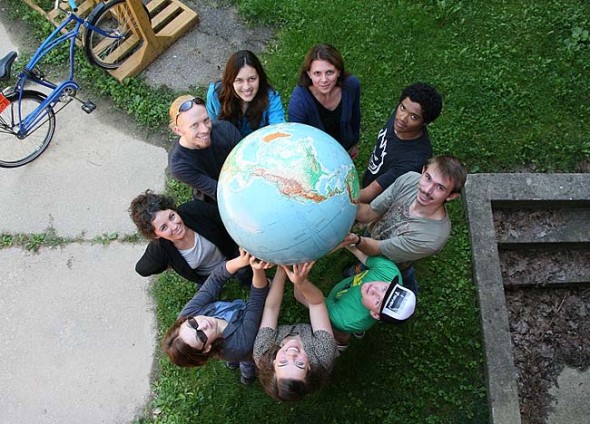
Participants in the recent Antioch College global seminar on water surround the globe because the earth is made up of mostly water. Begining at 12 o’clock going clockwise, Antioch College faculty member Robin Littell, Julian Smith ‘16, Alex Rolland ‘17, Sam Stewart ‘17, Shannon Hart ‘17, Rian Lawrence ‘17, faculty member Brooke Bryan, David Schopmeyer ‘16 and faculty and project leader Flauia Sancier. The community is invited to student presentations this Saturday, Sept. 13, from 9 a.m. to 12:30 at McGregor Hall. (Photo by Suzanne Szempruch)
A multi-lens look at water needs
- Published: September 18, 2014
The Water Crisis in Turkey.
Women and Water: Personal Explorations of Impact.
Compost Toilet Construction: a Feasibility Report.
The Weaponization of Water.
Impacts of Antioch College Water Damage.
Social, Cultural and Environmental Aspects of Lake Management.
These are a few of the presentations that villagers are invited to attend this Saturday, Sept. 13, from 9 a.m. to 12:30 p.m. at McGregor Hall during the Antioch College Water Symposium. The event is free and open to the community. For a complete list of presentation times and locations, go online to antiochcollege.org.
The symposium consists of 26 presentations made by 74 Antioch College students who in recent months took part in the college’s Global Seminar on Water. The course was team-led by instructor of cooperative education Brooke Bryan and writing instructor Robin Littell.
“Antioch College students in the Global Seminar on Water offer to look into our most pressing water issue and seek to address local, regional, national and global water crisis with innovative solutions,” according to seminar leaders in the class syllabus.
The current global challenges regarding water use and accessibility make it a natural topic for Antioch College students, according to Littell.
“The college’s focus on and commitment to sustainability demands that we engage those that can drive conversations that both inform us and serve as avenues for our students to affect change in the world,” she wrote in an email.
And it’s important to include the wider Yellow Springs community in the conversation, according to seminar leader Bryan.
“It provides a high stakes environment for our independent research because we are accountable to our peers in the community and imagining an audience beyond the classroom helps us learn how to locate our work when dealing with complicated, interconnected issues like water,” she wrote. “It also helps us forward our social justice and sustainability missions because we are able to catalyze important conversations in our community.”
The water course was the most recent Global Seminar, an Antioch College class that offers students an interdisciplinary look at issues critical to sustainability and social justice issues, including water, energy, food, governance, health and education, according to Global Education Dean Hassan Rahmanian, who oversees the seminars. In their course of study, students are required to take four Global Seminars.
The seminars “introduce students to multiple ways in which a selected problem area/theme can be approached, understood and investigated,” Rahmanian wrote in an email.
The interdisciplinary approach was meaningful to student Perin Ellsworth-Heller.
“This has been a really eye-opening experience/class in the sense that it covered water not only from a scientific and environmental point of view but also from a philosophical and humanistic perspective,” he wrote in an email. “I feel like the class has given me a cross-disciplinary look at a subject that is incredibly relevant to the modern world. I am now more convinced than ever that the only reasonable solutions to the world’s water problems will arise from a combination of many different ways of thinking.”
Many of the previous global seminars introduced students to a variety of perspectives on the topic, and the water seminar continued that tradition. The class included 17 speakers, including Allen Hunt, Wright State professor of geology and physics; Antioch University Midwest anthropologist Jim Malarkey; Rahmanian, speaking from a political perspective; activist Maya Nye, on the environmental crisis in the Appalachian hills; WYSO Environmental Reporter Lewis Wallace on “Pressures on the Great Lakes,” University of Dayton philosopher Bill Marvin on “Ethics, Technology, Water and Community” and Sarah Hippensteel of the Miami Conservancy District on getting engaged with regional policy.
The variety of speakers offer the opportunity for “a slightly different dynamic in the classroom,” according to Bryan. “Through the multimedia presentations, we glimpsed into the lives of squatters in Peru, women water carriers in West Africa who became permit-holding water managers in their community, Russian conservationists and Americans rethinking their relationship to the tap.”
Student Maya Canaztuj took the water seminar after working a co-op as a seasonal hydrologist with the Cleveland Metroparks.
“This job sparked my love for water, and I knew this class would be a great opportunity to learn more,” she wrote in an email. “The lectures have been great with so many knowledgeable people. My main gain was meeting the speakers, getting more information about their jobs and making those connections that could possibly be useful in the future.”
And for student Julia Bates, the seminar didn’t so much open her eyes to new problems, since her parents both grew up living next to polluted bodies of water, as it sparked new energy to tackle a critical issue.
“Seeing what others have done and are doing does give me hope,” Bates wrote.
The Yellow Springs News encourages respectful discussion of this article.
You must login to post a comment.
Don't have a login? Register for a free YSNews.com account.










No comments yet for this article.